#244 Robert Cialdini – Mastering the Seven Principles of Influence and Persuasion

Key Takeaways
The Seven Principle of Influence
- Reciprocity
- Liking
- Social Proof
- Authority
- Scarcity
- Commitment in Consistency
- Unity
“The thing I really wanted to answer as a researcher and a scholar, was what are the things that caused people to say yes, to request, to move them in the directions you’re asking them to move in the naturally occurring situations we all experience”
04:15 Transitioning Into Social Psychology
In college, Robert originally was working with a researcher on animal behavior. He ended up taking a social psychology class because a girl he had a crush on was taking the class, and Robert says, “by the end of the semester I was more enamored with social psychology than her.”
“Suddenly all the opportunities, all the freedoms, all the choices were mine and that caused me I think to really blossom as somebody who was not just able to do this stuff but so excited about the chance to find out what I was most curious”
7:20 Researching Real Influence
“The thing I really wanted to answer as a researcher and a scholar, was what are the things that caused people to say yes, to request, to move them in the directions you’re asking them to move in the naturally occurring situations we all experience”
Robert knew he had to get out of the university bubble he was in to find the results he was looking for. This caused Robert to join various training programs in sales, marketing, advertisers, recruiters, fundraisers, and more, to see what they were saying worked for them. This led Robert to recognizing six universal laws of influence that everybody was using which he included in each chapter of the first edition of his book, Influence.
“What surprised me was how small the footprint was of those things they all used systematically.”
“I think the greatest mistake I made professionally was not getting out of the lab and into the naturally occurring environment where the influence wars are being fought everyday”
13:15 Pre-Suasion
Robert tells the story of a salesman he met in one of the training programs that hit incredible sales numbers and what Robert noticed this man did that nobody else did.
“This guy did what I call pre-suasion, before he ever made his case he persuaded people to be in a state of mind that was going to foster and advance his case because he had arranged to be seen as a trustworthy source”
16:42 The Impact of Generosity
Whenever Robert is meeting people for the first time he expects the best from them which he says allows him to be generous with them.
The three results that come with the generosity:
- Likeability – they like him more for being generous with them
- Reciprocity – they give back the generosity to him that he first gave to them
- Commitment – after seeing themselves give to him, they feel committed to him and this leads to repeated patterns of commitment.
19:21 The 7 Principles of Influence
Reciprocity
“As children, we are taught to give back to others what they first gave to you”
Liking
“One clear way to get people to feel more rapport with us is simply to put to general similarities that exist between us”
Social Proof
“When people are uncertain, they don’t look inside themselves for answers, they look outside and one place they look is to their peers”
Authority
“Another place we look when we’re uncertain is to the opinions of genuinely acknowledged experts”
Scarcity
“People are more willing to move in our direction to the extent that what we have available to them is scarce, rare, or dwindling in availability”
- A limited number of something is more important to people than limited time
Commitment in Consistency
“People want to be consistent with what they have already said or done in your presence”
Unity
“We share with other people an identity, some kind of social identity to the extent that if we communicate that shared identity, they consider us one of them”
“That’s what I really tried to do with the new edition of the book, include the exact words you say, the exact sequence of the words you employ, much more than in previous editions”
33:30 Adding Unity as a Principle
Robert says that the research coming out of the academic research on persuasion science brought up the importance of unity.
“We’re seeing tribalism in our society now so people are responding to those who they feel loyal to inside their groups”
“Anything that hits me in one of two ways, that knocks me out how powerful this is or that puzzles me, how could this be? That gets me to zero in on it and learn as much as I can”
38:11 Ask for Advice, Not Opinions
All of the principles that Robert describes throughout his books are details that may seem incredibly minor, but are actually the driving force of the persuasion.
Robert uses the example about how we typically ask for opinions when we are trying to get buy-ins on our projects or initiatives. Robert says that instead of asking for their opinion, ask for their advice.
“When you ask for someone’s opinion, you get a critic. That person literally takes a half step back from you psychologically”
“I want to go from understanding it to how they triggered it. How do you make this powerful principle of human behavior actionable? Implementable? So that somebody who uses it ethically, will benefit both groups”
43:00 Post-Suasion
Robert’s book, Influence, is about what you put into a message to move people in your direction. His other book, Pre-Suasion, is about what you put into the moment before you send your message to put people in a mindset to be more receptive to your message. Post-Suasion is what the next arena Robert will think through, which is what you do after your message which makes your influence durable.
47:30 Foundational Resources
Robert mentions books that have been foundational pillars of his thinking:
53:51 Decision Making Shortcuts
Robert describes logic and feelings as “system 1 and system 2” and the 7 principles are his shortcuts to decision making in order to not overthink in each of the systems.
“That’s what I’ve considered those 7 principles of influence to be, they are shortcuts that allow me to move quickly and usually correctly”
57:00 Robert’s Interview Choice
If Robert could sit down and interview anyone dead or alive, just not a family or friend, he would choose Daniel Kahneman and Richard Thaler.

